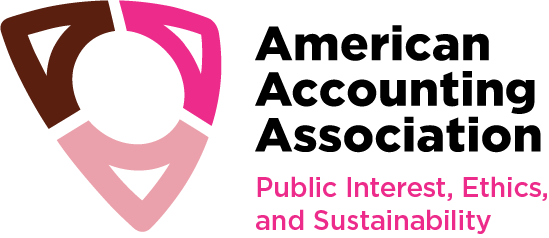Academy of Accounting Historians (AAH)
The Academy of Accounting Historians Section encourages research, publication, teaching and personal interchanges in all phases of accounting history and its interrelation with business and economic history including the environment within which they developed.
Accounting Behavior and Organizations (ABO)
The Accounting Behavior and Organizations Section promotes the integration of organizational and general system theories with developments in accounting theory. The former might include such constructs as organizational effectiveness, open vs closed systems, contingency theory, constituencies, and social responsibility accounting.
Accounting Information Systems (AIS)
The Accounting Information Systems Section creates and disseminates knowledge of accounting information systems and all aspects of information technologies as they relate to accounting by promoting excellence in research, teaching, and practice. The Section encourages and supports new scholars and educators in the field.
American Taxation Association (ATA)
The American Taxation Association fosters the dissemination and publication of taxation materials, promotes tax education and research, provides an interface among law, economics, and accounting, and encourages the interaction of tax academics, practitioners, and professional organizations.
Auditing (AUD)
The Auditing Section fosters excellence in scholarship surrounding auditing and related areas and to serve as a point of connection between practice and academia. The Section serves scholars in their endeavors to conduct high quality research and to education future professionals.
Engagement, Access and Community (EAC)
The Engagement, Access, and Community Section aims to be recognized as a Section where a broad range of experiences, ideas, insights, and voices contribute to meaningful progress in accounting education, research, and practice. To drive and support a resilient academic and professional environment with strong connections, open access to opportunities, and active participation.
Financial Accounting and Reporting (FARS)
The Financial Accounting and Reporting Section's mission is to give greater attention to financial accounting and reporting, and to improve the effectiveness and efficiency of education, research, and professional practice by (1) disseminating and evaluating teaching methods and materials; (2) encouraging, facilitating, and publicizing research interests and projects; and (3) creating opportunities for interchange and cooperation between academics and practitioners.
Forensic Accounting (FA)
The Forensic Accounting Section fosters excellence in teaching research, practice, continual professional education courses and curriculum development of forensic accounting services by creating opportunities to create relevant and innovative curricula with emphasis on effective and efficient instruction; promote and disseminate forensic and investigative research; forensic accounting and understanding the intersect with many other professions including law, criminology, sociology, cyber crime and many others.
Gender Issues and Worklife Balance (GIWB)
The Gender Issues and Worklife Balance Section of the American Accounting Association has the overall objective of facilitating interaction among Association members regarding gender issues and worklife balance as they relate to accounting practice, research, and education.
Government and Nonprofit (GNP)
The Government and Nonprofit Section's mission is to create and disseminate knowledge of government and nonprofit accounting including auditing, taxation, economics, health care, public administration, and public finance as they relate to accounting by promoting excellence in research, teaching, and practice. The Section encourages and supports new scholars and educators in the field.
International Accounting (IA)
The International Accounting Section encourages support, and promotes interest in all aspects of international accounting, both in the United States and globally, by promoting excellence in research, teaching, and practice. The Section encourages and supports new scholars and educators in the field.
Leadership in Accounting Education Section (Leadership)
The Leadership in Accounting Education Section stimulates the excellence in accounting education by contributing to the development of outstanding accounting program leadership and supporting and encouraging high-quality accounting programs.
Management Accounting (MAS)
The Management Accounting Section stimulates and improves the teaching of, research in, and practice of accounting that assists in the effective and efficient management of entities. The Section encourages and supports new scholars and educators in the field.
Public Interest, Ethics, and Sustainability (PIES)
The American Accounting Association Public Interest, Ethics, and Sustainability Section is committed to advancing the role of accounting in promoting the public trust, ethical behavior, and sustainable practices. We support the teaching of best practices, the dissemination of knowledge, rigorous academic research, and approaches that align accounting with the broader societal goals of professional ethics, accountability, corporate social responsibility, and environmental stewardship.
Strategic and Emerging Technologies (SET)
The Strategic and Emerging Technologies Section fosters excellence in the teaching, research, and application of strategic and emerging technologies, including artificial intelligence methods and techniques and to create and disseminate knowledge as they relate to accounting by promoting excellence in research, teaching, and practice.
Teaching, Learning and Curriculum (TLC)
The Teaching, Learning, and Curriculum Section is dedicated to the continual improvement of accounting education, especially through the development of relevant and innovative curricula, a renewed emphasis of effective and efficient instruction, and the exploration of knowledge organization issues related to accounting programs.
Two-Year College (TYC)
The mission of the Two-Year College Section is to develop innovative teaching techniques and to be a resource and voice for the two-year college community. The Section encourages and supports new scholars and educators in the field.
















